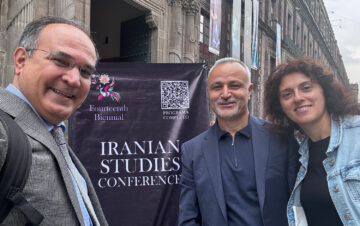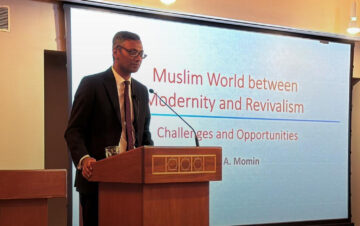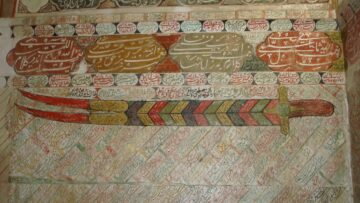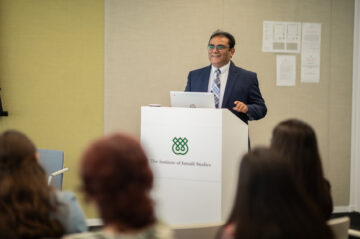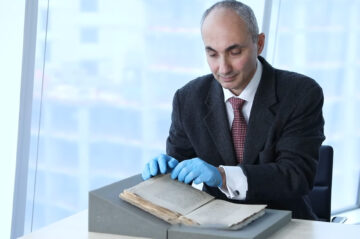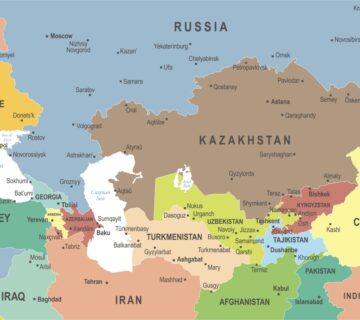Professor Wilferd Madelung, Senior Research Fellow at the IIS, received the Farabi International Award from Iran’s Ministry of Islamic Guidance and Culture for his outstanding contributions to Islamic and Iranian studies. The award is named in honour of the great Muslim philosopher, Abu Nasr al-Farabi, of Turkish descent from Iranian Central Asia, who studied and revived the tradition of ancient Greek philosophical thought in Baghdad, then the capital of the Muslim world. Farabi came to be known as al-Mu‘allim al-Thani, the Second Teacher, after Aristotle, considered the First Teacher of the philosophers. The award is aimed at promoting the civilization-building role of Muslim and human sciences and is held with the support and collaboration of the United Nations Educational Scientific and Cultural Organization (UNESCO) and the Islamic Educational, Scientific and Cultural Organization (IESCO).
Born in 1930, in Stuttgart Germany, Professor Wilferd Madelung is a leading contemporary Islamicist and has made significant contributions to modern scholarship on medieval Muslim communities and movements, including Twelver Shi‘ismSee Shi‘a., Zaydism and Ismaili Shi‘ism. Educated at the Universities of Cairo and Hamburg, he became Professor of Islamic Studies at the University of Chicago in 1969 and the Laudian Professor of Arabic at the University of Oxford from 1978 to 1998. Professor Madelung is the author of several books including, Succession to Muhammad: A Study of the Early Caliphate (1998), The Advent of the FatimidsMajor Muslim dynasty of Ismaili caliphs in North Africa (from 909) and later in Egypt (973–1171) More: A Contemporary Shi‘i Witness (2000) and Der Imam al-Qasim ibn Ibrahim und die Glaubenslehre der Zaiditen (2002). He has contributed extensively to learned journals, The Encyclopaedia of Islam and Encyclopaedia Iranica, of which he is a Consulting Editor.
In his acceptance speech, Dr Madelung said he felt, “deeply honoured and gratified for having been chosen for an award bearing the name of the great early Muslim philosopher Farabi”. He went on further to state the inter-dependence of civilisations that grow by “recognising and building upon the achievements of other, initially foreign civilisations”. In explaining why he has chosen in his research to delve extensively into the past conflicts among the early Muslims, he stated that one must resolve and learn from past conflicts not by ignoring them but by “trying to understand their roots and the motivation of all parties involved”.
The international section of the 4thFarabi International Award had seven winners, including Professor Madelung from Germany, Jean Joseph Perrot from France, Carlo Certi from Italy, Khaled Ghafouri from Iraq, Marcus Reiter from Germany, Masashi Honda from Japan and Bert Fragner from Austria. The 5th Farabi Internation Award ceremony will take place towards the end of 2011.

